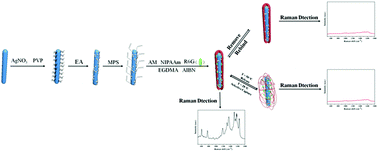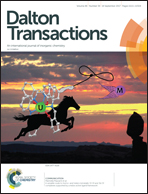Thermo-responsive molecularly imprinted sensor based on the surface-enhanced Raman scattering for selective detection of R6G in the water†
Abstract
In this study, a novel SERS sensor was successfully prepared by combining a molecular imprinted technique (MIT) with a SERS technique to improve the selectivity of the traditional SERS technique. Moreover, a thermo-sensitive technique was also introduced to confer stimuli-responsive properties to the materials. In a typical procedure, the Ag nanoparticles (NPs) were reduced on the surface of ZnO nanorods (NRs), and the ZnO/Ag heterostructures were used as the SERS substrates. Subsequently, a layer of thermo-sensitive imprinted polymer was coated on the surface of ZnO/Ag heterostructures to prepare the thermoresponsive ZnO/Ag/molecularly imprinted polymers (ZOA-TMIPs) by precipitation polymerization. Moreover, it was proven that the ZOA-TMIPs were regenerable and exhibited good reusability. The results proved that the materials in this study can be effectively used for residual organic dye detection in water.



 Please wait while we load your content...
Please wait while we load your content...